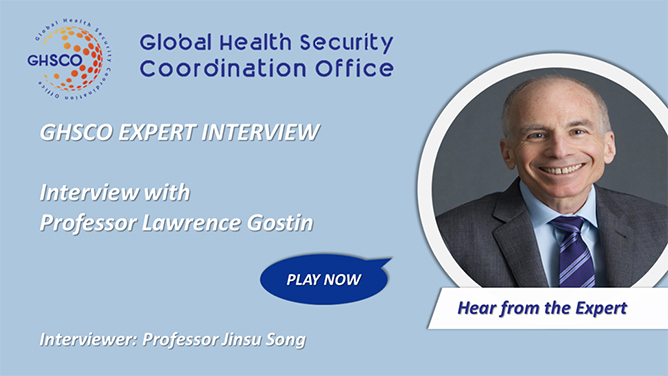
GHSCO Newsletter
June 2025
Volume2 Number2
Partner Stories2
“KDCA Strengthens Global Health Security with Strong National Public Health Institutes,” Says a Leading Expert
As the world continues to grapple with the aftermath of the COVID-19 pandemic and prepares for future health crises, the critical role of robust National Public Health Institutes (NPHIs) is more evident than ever. This was a key focus in a recent interview with Professor Lawrence O. Gostin of Georgetown University, a globally renowned expert in public health law, conducted by Professor Jin Su Song of Seoul National University College of Medicine for the GHSCO Newsletter on May 29, 2025.
Professor Gostin underscored that strong, sustainable national health authorities are "critically important" for both domestic public health and global health security, particularly in infectious disease control. He highlighted that the International Health Regulations (IHR) mandate core health system capacities including laboratory capabilities, surveillance systems, well-trained public health workforces and the abilities to rapidly detect and respond to novel outbreaks. "There’s no way to do that without a strong National Public Health Authority," Gostin stated, drawing on decades of experience working with NPHIs worldwide, especially the U.S. CDC. He stressed the importance for NPHIs of being agile, well-resourced, and deeply integrated within the broader healthcare system.
Bridging Divides: NPHIs Across the Income Spectrum
Recognizing differences in capacity between High-Income Countries (HICs) and Low- and Middle-Income Countries (LMICs), Professor Gostin noted that while their functions may differ, NPHIs in all settings can play a significant role. In LMICs, NPHIs often focus on essential services such as vaccination, maternal and child health, and basic surveillance. In contrast, HICs emphasize advanced research, sophisticated surveillance, and global leadership. Gostin advocated for a collaborative model where HICs learn from the "grassroots, ground-level delivery" in LMICs, while LMICs benefit from HICs' resources and advanced methodologies. The ultimate goal, he said, is to build a "firewall against health threats" from the local to the global level.
Strengthening Global Governance and Solidarity
The conversation also addressed the urgent need of reforming global health governance, especially within the WHO, to align with the evolving landscape of NPHIs. Gostin argued that NPHIs are vital for the effective implementation of WHO reforms and for ensuring compliance with IHR regulations. While the WHO provides normative guidance, real-world implementation depends heavily on capable national institutions. He proposed a "network of networks" approach, in which NPHIs collaborate regionally and globally to share best practices, resources, and personnel particularly to support LMICs. This distributed model could strengthen global preparedness and response, potentially filling gaps caused by funding shortfalls in international organizations.
Technological Advancements and Korea's Leading Role
The integration of advanced technologies such as AI and big data into public health was another key point. Gostin championed the use of these tools by NPHIs to enhance surveillance, early warning systems, and data-driven policy-making, enabling for "a smart and precise responses."
Professor Gostin particularly commended South Korea for its exemplary health system and potential lead global health security. He highlighted Korea's rapid learning from past challenges like the MERS outbreak and its remarkably effective response in the early stages of COVID-19. "In my mind, the Republic of Korea (ROK) is at the pinnacle of its region, and arguably the world," Gostin asserted, citing ROK's expertise, funding, and commitment. He emphasized Korea's unique position to lead "naturally, humbly, and quietly, yet effectively," through its actions, words, and dedication–not only to scientific exchange and innovation, but also to equity and inclusion in global health.
The interview concluded with a resounding call for continued investment in robust NPHIs and the fostering of global solidarity, recognizing that no single nation can confront future pandemics alone.
